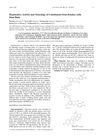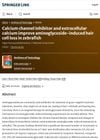99 citations,
September 2007 in “The American journal of pathology” Chemotherapy damages hair follicles, causing hair loss and other cellular changes.
 12 citations,
September 2014 in “Journal of Food Science and Nutrition”
12 citations,
September 2014 in “Journal of Food Science and Nutrition” Platycarya strobilacea extract is a strong antioxidant that can grow hair better than minoxidil.
 64 citations,
March 2005 in “Journal of Investigative Dermatology”
64 citations,
March 2005 in “Journal of Investigative Dermatology” Brain-Derived Neurotrophic Factor (BDNF) slows down hair growth and promotes hair follicle regression.
 58 citations,
January 2003 in “Biological & Pharmaceutical Bulletin”
58 citations,
January 2003 in “Biological & Pharmaceutical Bulletin” Bombax ceiba stem bark extracts can lower blood pressure, but high doses can be toxic and lethal.
15 citations,
December 2006 in “Clinical interventions in aging” 5 alpha-reductase inhibitors like finasteride may lower prostate cancer risk and improve cancer screening.
 105 citations,
September 1995 in “Journal of The American Academy of Dermatology”
105 citations,
September 1995 in “Journal of The American Academy of Dermatology” Recombinant cytokine therapy can cause skin reactions ranging from mild to severe.
3 citations,
January 2023 in “Nutrients” Hordenine may help hair grow by activating a specific cell growth pathway.
114 citations,
March 2010 in “Zebrafish” PROTO1 and PROTO2 protect against hearing damage.
 350 citations,
June 1989 in “The American Journal of Medicine”
350 citations,
June 1989 in “The American Journal of Medicine” Itraconazole is potentially effective for treating invasive aspergillosis, but more research is needed.
 88 citations,
February 2008 in “Journal of Medicinal Chemistry”
88 citations,
February 2008 in “Journal of Medicinal Chemistry” Scientists made the first metal-based compounds from a nonsteroidal antiandrogen drug, which showed potential in fighting both hormone-dependent and independent prostate cancer cells.
 January 1988 in “Journal of Pain and Symptom Management”
January 1988 in “Journal of Pain and Symptom Management” Pancreatic cancer pain management is inadequate due to the disease's severity and limited effectiveness of treatments.
 April 2018 in “Journal of Investigative Dermatology”
April 2018 in “Journal of Investigative Dermatology” Minoxidil didn't significantly increase hair growth in minipigs.
 28 citations,
January 1991 in “Reproductive Toxicology”
28 citations,
January 1991 in “Reproductive Toxicology” Finasteride temporarily lowers male rat fertility without affecting libido.
 166 citations,
November 1990 in “Journal of Investigative Dermatology”
166 citations,
November 1990 in “Journal of Investigative Dermatology” Minoxidil sulfate stimulates hair growth.
 122 citations,
July 1990 in “Teratology”
122 citations,
July 1990 in “Teratology” Finasteride exposure in pregnancy causes genital abnormalities in male rats.
 154 citations,
November 2017 in “Development”
154 citations,
November 2017 in “Development” Fibroblast Growth Factors (FGFs) are important for tissue repair and regeneration, influencing cell behavior and other factors involved in healing, and are crucial in processes like wound healing, bone repair, and hair growth.
 1 citations,
June 2022 in “Zagazig Veterinary Journal/Zagazig Veterinary Journal (Online)”
1 citations,
June 2022 in “Zagazig Veterinary Journal/Zagazig Veterinary Journal (Online)” Alopecia in dogs is often caused by mange, flea and tick infestations, and nutritional deficiencies, especially in males and young dogs.
 18 citations,
January 2017 in “Postępy Dermatologii i Alergologii”
18 citations,
January 2017 in “Postępy Dermatologii i Alergologii” EGFR inhibitors can cause various skin issues during cancer treatment, and managing these is important for patient care.
 9 citations,
March 2001 in “Clinics in dermatology”
9 citations,
March 2001 in “Clinics in dermatology” Hirsutism in women is often due to hormone sensitivity and has significant psychological effects.
 94 citations,
September 2014 in “Therapeutic Delivery”
94 citations,
September 2014 in “Therapeutic Delivery” Nanoparticles can improve skin treatments by better targeting hair follicles, but more research is needed for advancement.
 79 citations,
January 2017 in “Dermatology practical & conceptual”
79 citations,
January 2017 in “Dermatology practical & conceptual” Correcting nutrient deficiencies may help with hair loss, but the benefits of supplements without a deficiency are uncertain and could be harmful.
20 citations,
November 2021 in “Frontiers in cell and developmental biology” Skin organoids from stem cells could better mimic real skin but face challenges.
 99 citations,
July 2017 in “Clinical Reviews in Allergy & Immunology”
99 citations,
July 2017 in “Clinical Reviews in Allergy & Immunology” New treatments for Alopecia Areata show promise but need to be more effective and affordable.
 3 citations,
June 2023 in “The journal of investigative dermatology/Journal of investigative dermatology”
3 citations,
June 2023 in “The journal of investigative dermatology/Journal of investigative dermatology” The conclusion suggests that focusing on certain cellular pathways may improve the prevention and repair of hair loss caused by radiotherapy.
 9 citations,
July 2020 in “Journal of Animal Physiology and Animal Nutrition”
9 citations,
July 2020 in “Journal of Animal Physiology and Animal Nutrition” Melatonin given to pregnant rabbits improved their babies' fur quality.
 1 citations,
January 2013 in “Elsevier eBooks”
1 citations,
January 2013 in “Elsevier eBooks” The document reviews various hair and nail disorders, their causes, and treatments, emphasizing the need for proper diagnosis and the link between nail changes and systemic diseases.
 April 2024 in “Archives of toxicology”
April 2024 in “Archives of toxicology” Certain substances can protect against ear damage from some antibiotics in zebrafish.
 43 citations,
January 1977 in “Toxicology and Applied Pharmacology”
43 citations,
January 1977 in “Toxicology and Applied Pharmacology” Minoxidil is mostly safe, but high doses can cause electrolyte imbalances and heart issues in dogs.
 8 citations,
April 2020 in “Journal of Ethnopharmacology”
8 citations,
April 2020 in “Journal of Ethnopharmacology” Herbs might help with hair loss, but more research is needed to confirm their safety and effectiveness.
 218 citations,
January 2013 in “The Lancet Oncology”
218 citations,
January 2013 in “The Lancet Oncology” Chemotherapy causes hair loss by damaging hair follicles and stem cells, with more research needed for prevention and treatment.
























